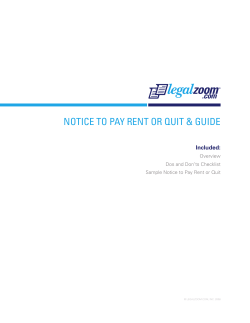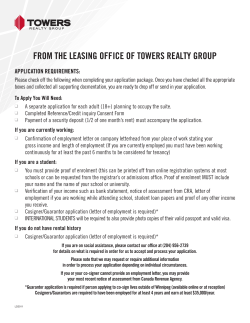
Are there sample letters renters can use
Question Are there sample letters renters can use to inform those new foreclosed owners that they have a minimum of 90 days to move out? Can a new owner require a tenant to pay rent during the 90-day period? I think that the foreclosure amount that affects renters is much higher in San Francisco. We have Veterans getting HUD-VASH vouchers and are going to open houses where there are 30-plus people trying to get the same apartment. In the 3/30/60/90 PTFA notices, what do the 30 and 60 refer to? Answer Sample letters are available in the NLIHC Renters in Foreclosure Toolkit, which is available for download at http://nlihc.org/library/other/foreclosure Yes, tenants are required to continue to pay rent. That’s very possible. Our calculations are limited by geography. The 30 and 60 day periods refer to the amount of notice required for tenants who are not bona fide, but who are still entitled to advance notice to vacate under governing state law. If bona fide tenant receives a 10-day The tenant should contact Fannie Mae to advise eviction notice from successor in interest that she is a bona fide tenant, providing proof of (Fannie Mae), how should advocate that status where possible. A foreclosure toolkit, proceed? available on NLIHC’s website at http://nlihc.org/library/other/foreclosure, provides a useful template and a copy of the current version of the PTFA. One of the problems I am seeing is the Pursuant to its express language, the protections agent for the lender pressuring tenants to of the PTFA are not triggered until complete title accept cash-for-keys or risk eviction. The has transferred post-foreclosure. Until that time, argument is that the grey area of the the applicable laws of the state and locality govern period after the foreclosure but before the tenancy. For this reason, there will be a lack of the successor of interest is triggered uniformity across the country in whether eviction "allows" the lenders to take these actions is permitted if a tenant chooses not to accept a without violating PTFA. What can be cash-for-keys agreement. done, especially when we're seeing lenders taking longer and longer to record the foreclosure? In foreclosure actions, servicers are Reports from advocates and tenants indicate that supposed to have a Single Point of there has not been success in finding SPOCs to Contact available for the homeowner. deal with tenant issues. Have advocates had success finding the SPOC to deal with tenant issues? Any ideas on how to get banks to honor Consumers can file complaints regarding non- their obligations to maintain their property? After many years of this problem, have banks created departments to deal with this issue? compliance of the PTFA through the Consumer Affairs department of the federal agency that supervises and examines the particular institution causing the grievance. The complaint system is meant to serve as a mediation tool between the bank and the consumer. The first step in addressing a concern regarding an action, or inaction, by a bank is to contact the institution itself and state the problem. If the bank is unable to resolve the issue, a complaint can be filed with the appropriate regulatory banking agency. To determine which agency regulates a particular institution, the consumer can visit http://www.ffiec.gov/consumercenter/default.aspx and enter the name of the bank. The correct agency to contact should appear. All of the agencies have an online complaint filing system that details what to include in the complaint and how to submit it. I’m a sheriff in NJ. What are we to advise plaintiffs when they request parties be removed that are not named individually and they do not have a lease? We request to see utilities in their name to verify that they are tenants. Many times the tenants pay in cash and do not get receipts. Neither a lease nor proof of utility payments is required to establish a bona fide tenancy. The PTFA was designed to be inclusive, requiring only that the rental agreement not be between enumerated family members, that it be the result of an arms’ length transaction, and that it not require rent that is substantially below fair market value. All such tenants are entitled under federal law to remain in their homes for the duration of their lease agreements, or for a minimum of 90 days with notice, regardless of the plaintiffs’ requests. Could you repeat what efforts are The Dodd-Frank Act authorized the creation of a pending to compile foreclosure data that national foreclosure database to be administered would include renter demographics, and by HUD in conjunction with other agencies. also, would such data include However, there is no deadline associated with the racial/ethnic demographics with possible creation of the database, or the associated disaggregation so that Asian Pacific rulemaking that is needed to properly implement Islander stats are included? the provision. Is here any protection for tenants who The PTFA language and the intent of the law are being asking to leave and want their support the notion that the successor in interest to security deposit? a property is obligated to return security deposit. It should be made clear that tenants don't The PTFA was intended to be a baseline, with the have to move out at the end of the 90 day hope and expectation that states would implement notice, at lease in MA. The landlord still their own, stronger protections above the PTFA. 2 has to go through Summary Process in court. What about defenses to paying rent such as habitability or using rent to stop utility termination? What should a bona fide tenant with lease do when they receive an illegal notice to vacate? If I have a local client who gets a (less than 90-day) notice to move out of a foreclosed property, what would be the first step in fighting this? In the case where a landlord is unknown, how do renters make payments on time? Is it advisable to establish an escrow account? Is a new owner allowed to increase the tenant's rent during the 90-day period if the tenant is month-to-month? And if so, what recourse does a tenant have if the new rent exceeds market rent? I think Richard Steiner of the San Diego Legal Aid office would beg to differ on the duty to pay rent to the foreclosing bank. He has a Court of Appeals case pending on this exact issue, and there are cases on both sides of the issue. What happens to Section 8 tenants that are not in their initial lease year term, and the lease is now month-to-month? Can't the new owner just give 90-day notice to terminate? Thanks for highlighting this. These defenses are available in the PTFA context, however, state law may set forth required steps that must be taken prior to rent abatement. For example, state law may require a tenant to provide advanced notice to her landlord before reducing or ceasing her rental payments. Tenants should advise the notifying parties in writing of their bona fide status. They should also provide any proof of this status, such as a copy of their lease. The toolkit available on NLIHC’s website, located at http://nlihc.org/library/other/foreclosure, provides sample letters for renters to use, along with a copy of the PTFA law. Creating an escrow account and depositing monthly payments into the account when the defaulting landlord refuses rent may support the argument that the tenant has supported the terms of the lease Typically, notice must be provided that advises of an increase in rent. The PTFA is silent on this issue so state-landlord tenant law should be followed. PTFA is a relatively new law that is still being interpreted by the courts at the federal and state levels. There is a lack of consensus on a variety of issues, such as the one you’ve highlighted. Yes, but they will have to comply with the housing assistance payment contract during that time. 3
© Copyright 2025













![Sample Letter: Improper Rule Change/Fee or Rent Increase [Date] [Landlord/Manager’s Name]](http://cdn1.abcdocz.com/store/data/000031198_2-6d3ce7b943ede5629a20f08c47060981-250x500.png)







